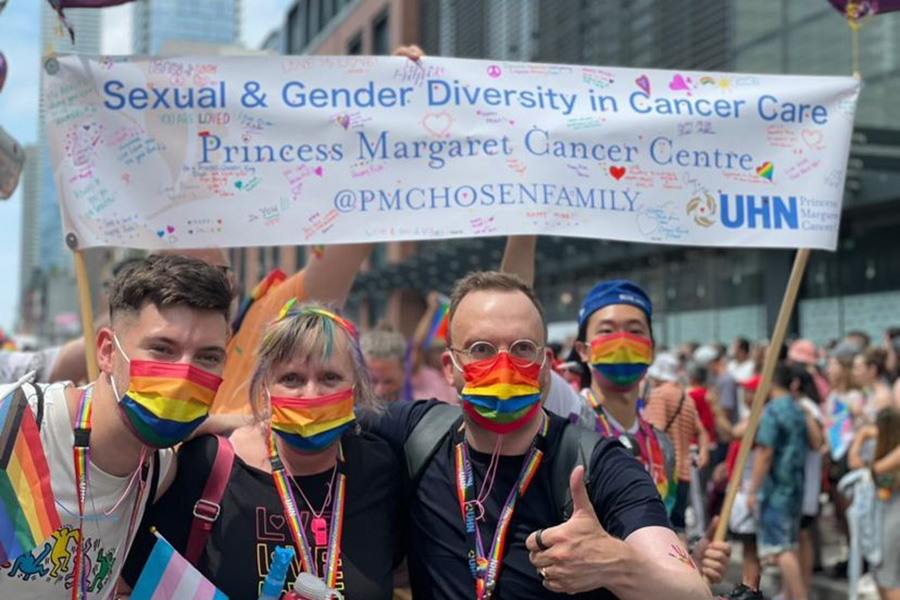
Sexual and gender-diverse communities have a history of experiencing discrimination in health care.
Every time a patient is misgendered, addressed with incorrect pronouns, or sexually stigmatized in a health care setting, they are less likely to attend future appointments – creating a gap in care.
In the case of cancer, that can mean less likelihood of being screened for the disease or treated for it.
At the Princess Margaret Cancer Centre, the Sexual and Gender Diversity in Cancer Care (SGDc) Program is closing that care gap by developing innovative strategies and solutions to improve the health care experience of members of 2SLGBTQIA+ communities.
"On World Cancer Day, we recognize the work of the committee in transforming cancer care by delivering high quality care that is equitable for all patients regardless of their race, ethnicity, income, ability, gender identity and sexual orientation," says Dr. Keith Stewart, Director of the Princess Margaret Cancer Centre.
"We acknowledge the harm that healthcare systems have caused to 2SLGBTQIA+ communities, and recognise our responsibility as a world-leading cancer centre to make changes within the system to rebuild trust."
The theme for this year's World Cancer Day on Saturday, Feb. 4 is “Close the Care Gap," which is aimed at addressing barriers to cancer care locally and globally, whether those barriers are a result of income, education, geographic location or discrimination.
The SGDc Program is working towards creating a more inclusive environment, educating health care providers about best-care practices and inclusive communication, and conducting primary research for SGDc communities. Such improvements aim not only to increase the survival rates of sexual and gender diverse cancer patients in Canada – but to set an example globally.
"Last year, a survey of the Gynecology Clinic by two of our SGDc members revealed that the majority of staff felt comfortable treating patients who identified as 2SLGBTQIA+, but didn't possess the knowledge necessary to communicate with patients in an inclusive manner," says Brendan Lyver, a research analyst at the Princess Margaret and executive member of the SGDc Program.
"There's a clear want to have this education, but no one's providing it. You don't learn about this in your undergrad – not in med school, nursing school, or many other forms of training and education."

The program's new educational module is designed to improve communication, engagement and inclusivity in the cancer centre. The curriculum focuses on pronouns, gender identity, sexual orientation and relationship diversity in cancer care.
"These modules enable providers to apply their learning and practice communication with a virtual avatar, which will serve as a great first step towards achieving inclusive care," says Margo Kennedy, oncology social worker and Clinical Lead of the SGDc Program at the Princess Margaret.
The committee also launched their own social media accounts as a means of sharing educational material, promoting inclusivity, and connecting 2SLGBTQIA+ communities with health care providers.
Their "Monday Challenge" posts are geared towards equipping health care staff with a deep understanding of SGDc patient perspectives, and how to implement inclusive care in clinical settings. Their "Thursday Research" posts present cancer research findings with a specific focus on 2SLGBTQIA+ communities.
On the hospital level, the program has distributed rainbow lanyards, masks, and pronoun buttons to staff, and developed an extensive guide to community resources for SGDc patients and families.
While these changes enable patients to feel more included and recognized, Margo says it's critical to address patients' intersectional identities, and the power inequities that can result.
"They're bringing unique identities regarding their race, culture and ethnicity – all those things make up key parts of who they are, and both the privileges and disadvantages they face in cancer care."
iowyth ulthiin, a transgender, non-binary, Indigenous person, says it's common for marginalized communities to have negative experiences in health care. When io was diagnosed with non-Hodgkin lymphoma, this became evident.
"Part of the issue with my cancer journey was the fear of doctors and hospitals, which led to me not coming in to get assessed until it was quite late," says io, a member of the Metis Nation of Ontario.
By the time io was diagnosed, their cancer had already progressed to an advanced stage. Thankfully, their prognosis was positive with a 90 per cent chance of recovery. io is now in remission.
"Sometimes people like me will have alienated relationships with their families, so I was doing this totally on my own," io says. "It was very hard, socially and economically."
'Access to cancer care is a global concern'
io faced various financial barriers throughout their cancer journey, which forced them to work during their chemotherapy treatments. They struggled to afford the many hidden costs that go along with cancer treatment, such as transportation expenses, drug coverage and over-the-counter medications – along with finding an adequate place to live, and access to healthy food.
"The disconnect between all the different parts of a person's needs undermines the ability to receive proper care," io says. "The root of the issue needs to be addressed, which are the socially-disabling situations we find ourselves in."
While io is an example of a marginalized person who caught their cancer on time, and therefore had a favourable outcome, there are many more who cannot say the same.
"Access to cancer care is a global concern, and for too long, it was simply accepted that certain privileged groups of patients receive care while others do not, and consequently die early, irrespective of the underlying complex reasons for this disparity," says Dr. Christian Schulz-Quach, psychiatrist in the Department of Supportive Care at the Princess Margaret, and the Lead of the SGDc Program.
"With increasing awareness and understanding of the role intersectional identities and minority stress play in accessing high-quality cancer care, we learn that to achieve health equity, we need to inform, educate and advocate for system-level changes."
io agrees, noting that in order to provide adequate care, health care professional need to consider the multi-faceted factors that contribute to a person's illness in the first place.
"Why are we sick at all?" io says.
Thanks to Princess Margaret's SGDc Program, Canada is one step closer to closing the gap in cancer care.
And one step closer to driving change all around the world.
This story first appeared on UHN News